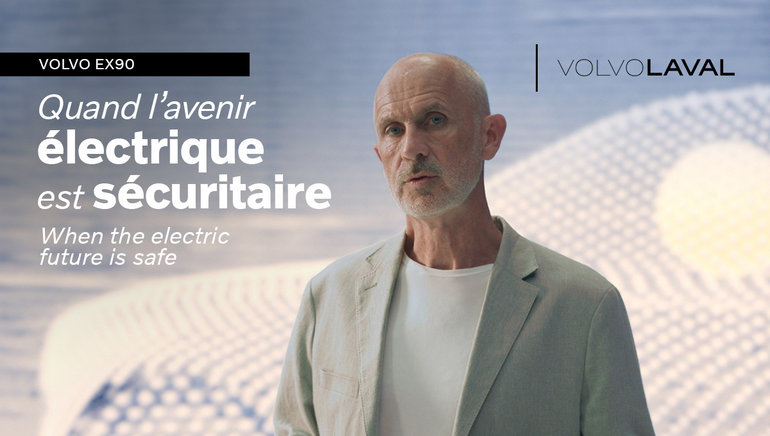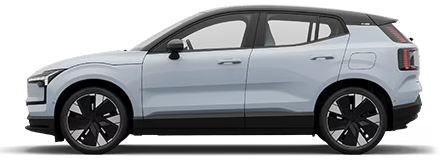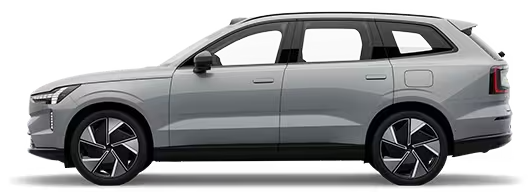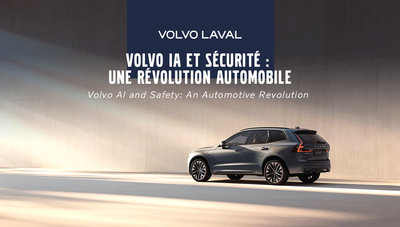Volvo EX90: The safe and innovative electric future
September 15 2022, Volvo Laval

Discover the Volvo EX90 2023: Technological preview
Don't look for the Volvo EX90 2023 on the market just yet. Wait a few weeks for the unveiling of the grand Swedish SUV, the successor to the Volvo XC90 2022. However, the Scandinavian manufacturer has already revealed the advanced technologies that will equip this new vehicle. Stay tuned for an exclusive preview of what lies beneath the innovative exterior of the Volvo EX90.
Volvo EX90: Safety at the heart of innovations
Unsurprisingly, safety will be Volvo’s primary concern with its 2023 EX90. Volvo vehicles have always been, and still are, among the safest on the market.
Historically, Volvo has also been a pioneer in this field. It is to this company that we owe, among other things, the invention of the three-point safety belts that equip all cars on our roads. This includes, of course, all Volvo models such as the great XC90.
The new 2023 Volvo EX90 will, however, go a step further by using more refined technological innovations than ever before. Among other things, the vehicle will rely on cameras, radar and Lidar technology to ensure the highest possible safety for its occupants.

What is Lidar?
We’ve all heard this name over the past few months, since Lidar technology is the basis for the development of most autonomous cars. This time, it will be used for the safety of Volvo SUV occupants.
Basically, Lidar is a laser pointer that shoots beams in front of it, seizing bounces and echoes. From what it receives, it can digitally draw a three-dimensional picture of the environment, and react to obstacles. You could almost say that it is a pair of digital eyes.
Yet, unlike eyes, Lidar has very few limitations. It can detect objects in the most difficult conditions, including darkness or rain. It can also intervene by detecting smaller moving objects, including pets. It is also active at highway speeds.

Advanced safety in the Volvo EX90: Cutting-edge technologies
To further enhance safety, Lidar will be accompanied by an array of sensors, radars, and headlights ensuring maximum vigilance. Thus, the EX90 SUV establishes itself as the safest Volvo model on the market. It is estimated to reduce the risk of injuries or fatalities for its occupants by 20% and decrease the risk of collisions by 9%.
Moreover, it is important to highlight that Volvo vehicles are already equipped with several highly effective onboard safety systems, present in most of their models. Among these technologies, we find:
- Collision avoidance
- Lane keeping assist
- Road departure mitigation
- Cross traffic alert with automatic braking
- Blind spot information system
- Panoramic camera
Volvo: Safety even inside the cabin
Safety in the 2023 Volvo EX90 is not just on the outside. An invisible shield of sensors and cameras will be installed directly inside the electric Volvo. By focusing on the driver’s eyes, and analyzing his or her head movements, the car will be able to issue alerts if the driver loses concentration.
Even better, if the driver falls asleep or feels unwell, the car will be able to pull over to the side of the road and stop, in addition to issuing a distress call via cellular waves.

What engine powers the Volvo?
For the moment, no specific information has been released about the electric engine that will be under the hood of the Volvo EX90. We only know that it will be equipped with a 100% electric motor with a competitive range.
|
Model Volvo |
Technology |
Electric Range |
|
C40 |
100 % electric |
364 km |
|
XC40 |
100 % electric |
359 km |
|
XC60 |
Plug-in hybrid |
58 km |
|
XC90 |
Plug-in hybrid |
53 km |
|
V60 |
Plug-in hybrid |
64 km |
|
S90 |
Plug-in hybrid |
61 km |
|
S60 |
Plug-in hybrid |
64 km |
However, it is important to note that Volvo has confirmed that all its vehicles will be electrified by 2025. The company already has two electric SUV models, in addition to some hybrid versions, all grouped under the name Recharge.
How to optimize the use of screens and apps in the Volvo EX90?
The 14.5-inch tablet-style central display offers a clear and bright view of your journey. It allows intuitive control of your favorite apps and essential functions. This central display greatly enhances the driving experience by making information easily accessible.
The 9-inch driver display shows the driver’s key information at a glance. You can choose between three modes:
- Surround Mode
- Map Mode
- Calm Mode
For a seamless infotainment experience, the Volvo EX90 integrates Google. Get your favorite apps, such as Google Assistant and Google Maps, directly via Google Play. This integration ensures easy and quick access to all your essential apps and services.
By using these advanced features, your journey becomes more enjoyable and connected. The Volvo EX90 combines technology and comfort for an exceptional driving experience.

What is the battery range of the Volvo EX90?
The 2025 Volvo EX90 features a robust 111 kWh battery. This battery offers an impressive range of approximately 482.8 kilometers on a single charge. This places the EX90 among the top electric SUVs on the market. It rivals models like the Tesla Model X and Audi e-tron. Additionally, the EX90's fast charging capability further enhances its appeal. In summary, the Volvo EX90 combines performance and exceptional range for an optimal driving experience.
How long can I drive before needing to recharge the fully electric Volvo EX90?
The range of the fully electric Volvo EX90 depends on several factors. Driving style, outside temperature, weather conditions, wind, topography, and roads all influence the range. Additionally, using electricity for heating and air conditioning also impacts the distance traveled. To improve range, precondition your car during charging. This way, it will already be at a comfortable temperature when you start your journey. On average, the Volvo EX90 can travel approximately 482.8 kilometers on a single charge.

What is the fastest way to recharge my fully electric Volvo EX90 on long trips?
The fastest charging for your Volvo EX90 is at DC fast charging stations along your route. To optimize charging time, limit the charge level to 80%. This strategy reduces your charging times, as the last 20% takes the most time. Charging the battery from 10% to 80% with a 250 kW fast charger can take up to 30 minutes. If necessary, you can charge up to 100% via the central screen settings. Charging times vary depending on outside temperature, battery temperature, charging equipment, and the car's condition.


























